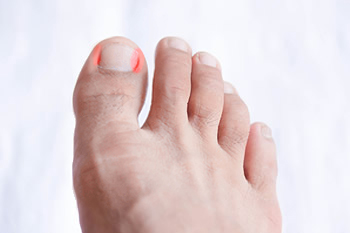Manalapan
(732) 845-0100
Manalapan (732) 845-0100

Recognizing an ingrown toenail can be tricky. One symptom many people ignore is the redness surrounding the big toe, which is often the first indication that an ingrown toenail has developed. Severe pain often follows, and the ingrown toenail can become infected. At this point, a podiatrist who can effectively treat this foot condition should be consulted. An ingrown toenail is defined as a nail that grows into the skin instead of over it. It may result from improperly trimming the toenails, sustaining a toe injury, or wearing shoes that are too tight. For mild cases, the foot may feel better when it is soaked in warm water. This may temporarily provide relief, but it may become worse if medical attention is not sought. If you have developed an ingrown toenail, it is strongly advised that you consult a podiatrist who can treat this condition.
Ingrown toenails can become painful if they are not treated properly. For more information about ingrown toenails, contact Dr. Charles Marchese of Manalapan Foot & Ankle. Our doctor can provide the care you need to keep you pain-free and on your feet.
Ingrown Toenails
Ingrown toenails occur when a toenail grows sideways into the bed of the nail, causing pain, swelling, and possibly infection.
Causes
Prevention
Because ingrown toenails are not something found outside of shoe-wearing cultures, going barefoot as often as possible will decrease the likeliness of developing ingrown toenails. Wearing proper fitting shoes and using proper cutting techniques will also help decrease your risk of developing ingrown toenails.
Treatment
Ingrown toenails are a very treatable foot condition. In minor cases, soaking the affected area in salt or antibacterial soaps will not only help with the ingrown nail itself, but also help prevent any infections from occurring. In more severe cases, surgery is an option. In either case, speaking to your podiatrist about this condition will help you get a better understanding of specific treatment options that are right for you.
If you have any questions please feel free to contact our office located in Manalapan, NJ . We offer the newest diagnostic and treatment technologies for all your foot and ankle needs.

Broken bones in the ankle can occur due to an injury or a mishap. When there is a break in the ankle joint, the bones can separate into pieces. The tibia or fibula are often the most affected because they support the weight of the body. This type of fracture may cause severe discomfort while walking and may be difficult to do for several months. A broken ankle typically occurs from rolling or twisting the ankle beyond its normal range of motion, such as from unexpectedly stepping off of a curb. Common symptoms that many people experience with an ankle fracture can include bruising, and swelling, and it can be tender when touched. An X-ray is generally performed which is successful in determining the extent of the fracture and can then be treated accordingly. There are several methods to treat a broken ankle, consisting of wearing a walking boot, having a cast put on, and elevating the affected foot as often as possible. If you have endured a fractured ankle, it is strongly advised that you speak to a podiatrist who can effectively access the foot and offer the best treatment options for you.
Broken ankles need immediate treatment. If you are seeking treatment, contact Dr. Charles Marchese from Manalapan Foot & Ankle. Our doctor can provide the care you need to keep you pain-free and on your feet.
Broken Ankles
A broken ankle is experienced when a person fractures their tibia or fibula in the lower leg and ankle area. Both of these bones are attached at the bottom of the leg and combine to form what we know to be our ankle.
When a physician is referring to a break of the ankle, he or she is usually referring to a break in the area where the tibia and fibula are joined to create our ankle joint. Ankles are more prone to fractures because the ankle is an area that suffers a lot of pressure and stress. There are some obvious signs when a person experiences a fractured ankle, and the following symptoms may be present.
Symptoms of a Fractured Ankle
If you suspect an ankle fracture, it is recommended to seek treatment as soon as possible. The sooner you have your podiatrist diagnose the fracture, the quicker you’ll be on the way towards recovery.
If you have any questions, please feel free to contact our office located in Manalapan, NJ . We offer the newest diagnostic and treatment technologies for all your foot care needs.

Many people are surprised by the amount of pain that a corn can cause because they are so small. When they develop on the outside of the pinky toe, it can alter the gait or walking style, and can be quite uncomfortable. This type of corn generally occurs from wearing shoes that do not fit correctly, and the pain may gradually subside when a protective covering is worn over it. If it is severe, and causes difficulty in completing daily activities, it may have to be surgically removed. Corns can fit into three categories. A corn on the pinky toe is considered to be a hard corn. This type of corn is the most common, and can also develop on the tops of the toes, or on the balls of the feet. Having dry skin may produce seed corns, and these are often found in clusters. Soft corns are rubbery in texture, and can be found between the toes, which can be a result of the moisture from sweat that can accumulate there. It is beneficial to wear shoes that are larger, which may help to accommodate the corn, and relief may be found when the shoes provide adequate shock absorption. If you have developed corns of any type on your feet, please confer with a podiatrist who can effectively treat this foot condition.
If you have any concerns regarding your feet and ankles, contact Dr. Charles Marchese of Manalapan Foot & Ankle. Our doctor will treat your foot and ankle needs.
Corns: What Are They? and How Do You Get Rid of Them?
Corns can be described as areas of the skin that have thickened to the point of becoming painful or irritating. They are often layers and layers of the skin that have become dry and rough, and are normally smaller than calluses.
Ways to Prevent Corns
There are many ways to get rid of painful corns such as wearing:
Treating Corns
Treatment of corns involves removing the dead skin that has built up in the specific area of the foot. Consult with Our doctor to determine the best treatment option for your case of corns.
If you have any questions please feel free to contact our office located in Manalapan, NJ . We offer the newest diagnostic and treatment technologies for all your foot and ankle needs.

The ankle is a complex structure of bones, tendons, and ligaments that work together to carry your weight anytime you stand, walk, run, or play sports. If you have mobility problems, there are a number of exercises that can strengthen the ankles and help to prevent injury. Ankle exercises can also improve stability and flexibility. Improving the stability of your ankles on a daily basis has other benefits, such as helping you walk properly and preventing knee and hip injuries. Stiff or tight ankles can make it more difficult to flex and extend the foot, which inhibits your ability to walk uphill. Weak ankles can add to the risk of a sprain or other injury, when the joint gives way while walking or standing. Experts believe that strengthening the ankles can also help to increase bone density and ward off osteoarthritis. It can also help to reduce pressure on the joint and reduce the risk of falls. If you need information on exercises that can strengthen your ankles and increase their flexibility, please consult a podiatrist.
Ankle pain can be caused by a number of problems and may be potentially serious. If you have ankle pain, consult with Dr. Charles Marchese from Manalapan Foot & Ankle. Our doctor will assess your condition and provide you with quality foot and ankle treatment.
Ankle pain is any condition that causes pain in the ankle. Due to the fact that the ankle consists of tendons, muscles, bones, and ligaments, ankle pain can come from a number of different conditions.
Causes
The most common causes of ankle pain include:
Symptoms
Symptoms of ankle injury vary based upon the condition. Pain may include general pain and discomfort, swelling, aching, redness, bruising, burning or stabbing sensations, and/or loss of sensation.
Diagnosis
Due to the wide variety of potential causes of ankle pain, podiatrists will utilize a number of different methods to properly diagnose ankle pain. This can include asking for personal and family medical histories and of any recent injuries. Further diagnosis may include sensation tests, a physical examination, and potentially x-rays or other imaging tests.
Treatment
Just as the range of causes varies widely, so do treatments. Some more common treatments are rest, ice packs, keeping pressure off the foot, orthotics and braces, medication for inflammation and pain, and surgery.
If you have any questions, please feel free to contact our office located in Manalapan, NJ . We offer the newest diagnostic and treatment technologies for all your foot care needs.